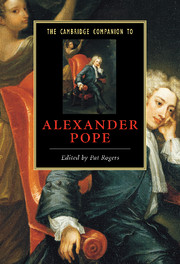Book contents
- Frontmatter
- Introduction
- 1 Pope, self, and world
- 2 Pope’s friends and enemies: fighting with shadows
- 3 Pope’s versification and voice
- 4 Poetic spaces
- 5 Pope’s Homer and his poetic career
- 6 Pope and the classics
- 7 Pope and the Elizabethans
- 8 Pope in Arcadia: pastoral and its dissolution
- 9 Pope and ideology
- 10 Pope and the poetry of opposition
- 11 Crime and punishment
- 12 Landscapes and estates
- 13 Money
- 14 Pope and the book trade
- 15 Pope and gender
- 16 Medicine and the body
- 17 Pope and the other
- Further reading
- Index
1 - Pope, self, and world
Published online by Cambridge University Press: 28 April 2008
- Frontmatter
- Introduction
- 1 Pope, self, and world
- 2 Pope’s friends and enemies: fighting with shadows
- 3 Pope’s versification and voice
- 4 Poetic spaces
- 5 Pope’s Homer and his poetic career
- 6 Pope and the classics
- 7 Pope and the Elizabethans
- 8 Pope in Arcadia: pastoral and its dissolution
- 9 Pope and ideology
- 10 Pope and the poetry of opposition
- 11 Crime and punishment
- 12 Landscapes and estates
- 13 Money
- 14 Pope and the book trade
- 15 Pope and gender
- 16 Medicine and the body
- 17 Pope and the other
- Further reading
- Index
Summary
Behold it is my desire, that my adversary had written a book. Surely I would take it on my shoulder and bind it as a crown unto me.
(Job, xxxi, 35)I have heard Mr. Richardson relate that he attended his father the painter on a visit, when one of Cibber's pamphlets came into the hands of Pope, who said, “These things are my diversion.” They sat by him while he perused it, and saw his features writhen with anguish; and young Richardson said to his father, when they returned, that he hoped to be preserved from such diversion as had been that day the lot of Pope.
(Samuel Johnson, Lives of the Poets, III, 188)Alexander Pope, eighteenth-century England's most prominent poet and his generation's most frequently portrayed celebrity, dominated the emergent literary marketplace as the first self-supporting, non-playwriting professional author (shrewd enough to rely on an aristocratic coterie of subscribers to get his start, yet savvy enough to supervise almost every aspect of the publication process), while fascinating his audience as a spectacle of deformity. Characterizing the life of a wit in the preface to the first published volume of his Works (1717) as “a warfare upon earth,” and complaining as a well-established poet and celebrity in his 1735 Epistle to Arbuthnot of “this long disease, my life,” which poetry and friendship served to ease, this protean master of the heroic couplet suffered a war between an exceptional mind and a body lambasted as “at once resemblance and disgrace” of humanity's “noble race.” Barely four and a half feet tall when grown, in Voltaire's words “protuberant before and behind” (current medical science attributes his deformity to childhood tuberculosis of the spine, otherwise known as Pott's disease, contracted from a wet nurse, while his contemporaries also considered trampling by a cow and excessive study as potential causes), socially disenfranchized for his Catholicism, Pope transformed his marginality into a source of creative self-reflection, self-possession, and self-legitimation. His life's work was the ultimate couplet of deformity and poetic form.
- Type
- Chapter
- Information
- The Cambridge Companion to Alexander Pope , pp. 14 - 24Publisher: Cambridge University PressPrint publication year: 2007
- 1
- Cited by



